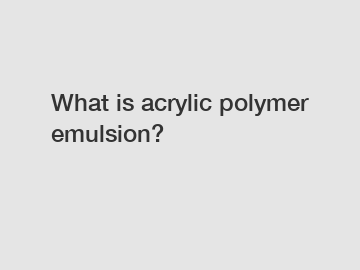What is acrylic polymer emulsion?
What is acrylic polymer emulsion?
Acrylic polymer emulsion is a widely used material in various industries, including paint, coatings, adhesives, textiles, and paper. But what exactly is acrylic polymer emulsion, and why is it so popular? Let's delve deeper into this fascinating subject.
1. Definition and Composition:

Acrylic polymer emulsion is a water-based dispersion of acrylic resin particles. It is produced by the polymerization of acrylic monomers, such as methyl methacrylate, butyl acrylate, and acrylic acid. The resulting emulsion consists of tiny acrylic particles suspended in water, creating a milky liquid.
2. Versatility in Applications:
One of the main reasons for the widespread use of acrylic polymer emulsion is its versatility. It can be used in a wide array of applications, owing to its excellent binding properties, flexibility, and durability. Acrylic emulsions are commonly employed as binders in paints and coatings, providing adhesion to various surfaces and enhancing film formation.
3. Benefits in Paints:
Acrylic polymer emulsions offer several advantages in the paint industry. Firstly, they provide excellent color retention, resisting fading caused by ultraviolet (UV) exposure. Additionally, acrylic emulsions offer good resistance to water, chemicals, and weathering, making them suitable for both interior and exterior paints. Their quick drying time and low odor make them a preferred choice for indoor use.
4. Enhancing Textiles:
Acrylic polymer emulsions find considerable use in the textile industry. They impart improved durability, softness, and resistance to soiling or wrinkling in fabrics when used as a finishing agent. By applying acrylic emulsion on textiles, manufacturers can enhance the overall quality and appeal of their products.
5. Adhesive Applications:
Acrylic polymer emulsions are widely used in adhesives due to their high bonding strength and compatibility with different substrates. These emulsions can be tailored to meet specific requirements, such as flexibility, heat resistance, or transparency. They are used in a broad range of adhesive products, including wood glue, paper glue, pressure-sensitive adhesives, and even medical adhesives.
6. Paper Coatings:
With their excellent film-forming properties, acrylic polymer emulsions are also utilized in the production of coated papers. These emulsions enhance paper performance by providing ink holdout, gloss, and smoothness. They allow for better print quality and prevent ink from bleeding or feathering on the paper surface, resulting in sharp and vibrant images.
7. Environmental Friendliness:
Acrylic polymer emulsions have gained popularity due to their environmental advantages. Being water-based, they have lower levels of volatile organic compounds (VOCs) compared to their solvent-based counterparts, contributing to better air quality. Moreover, many acrylic emulsions are now produced using eco-friendly practices and renewable resources, reducing their overall environmental impact.
In conclusion, acrylic polymer emulsion is a versatile material with a wide range of applications across various industries. Its composition, consisting of tiny acrylic resin particles suspended in water, allows for easy dispersion and application. Acrylic emulsions offer numerous benefits such as excellent adhesion, color retention, durability, and resistance to water and weathering. They are widely used in paints, coatings, adhesives, textiles, and paper products. Moreover, acrylic emulsions, with their lower VOC content and sustainable production methods, provide an environmentally friendly alternative to solvent-based materials. As industries continue to innovate and develop new uses for acrylic polymer emulsion, its importance and popularity are only set to increase.
Are you interested in learning more about styrene butadiene rubber latex, Why Choose Latex Backed Artificial Grass, Acrylic Emulsion supplier? Contact us today to secure an expert consultation!



Comments
0